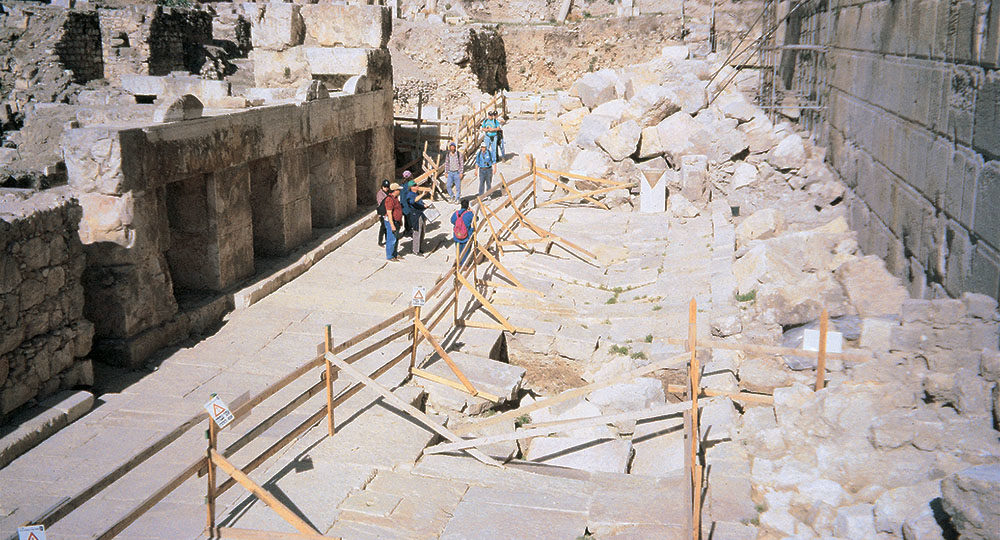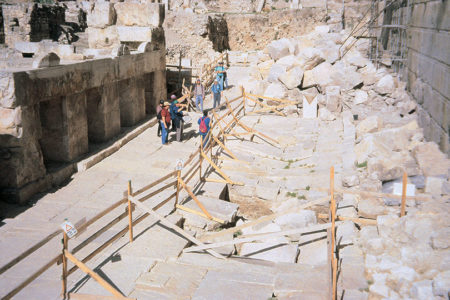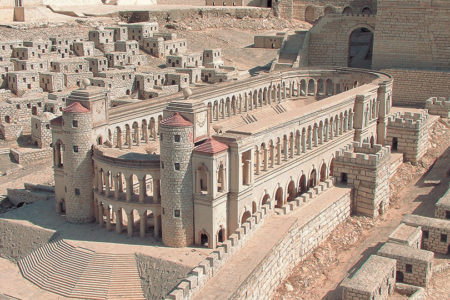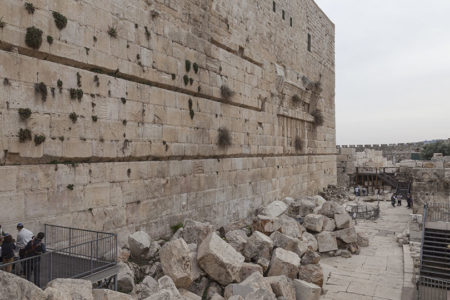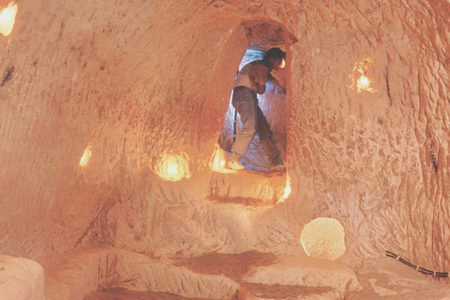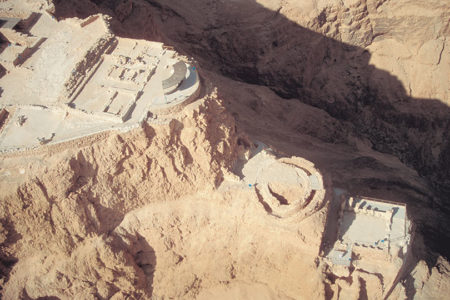How Important Is the Temple Mount Controversy?
During a recent radio interview I was asked about the importance of Israel’s decision to allow Christians and Jews to have access once again to the Temple Mount in Jerusalem. The issue was whether the Temple Mount holds any significance for Jews and Christians in this dispensation. My answer was an emphatic yes for many important reasons.
Islam Denies
a Jewish Presence on Moriah
Palestinians and many of their fellow Muslims claim there has never been a Jewish Temple or presence on the Temple Mount in Jerusalem. Jewish people and evangelical Christians know this astonishing perversion of history is patently ridiculous. Nevertheless, it is gaining credence both in the Muslim world and with people who are biblically and historically illiterate.
These are the same elements that have signed on to the notion that the Holocaust was fabricated and never actually took place, even though the Third Reich meticulously and thoroughly recorded the details of its own atrocities during Hitler’s infamous bloodbath of sixty years ago.
To certify their claims, Muslim authorities involved with excavations at the Mount have deliberately destroyed archaeological artifacts from the first and second Temple periods that would contradict their revisionist propaganda. To the world at large, their assertions and counter assertions are of little consequence. But for Jewry, Christianity, and the world of Islam, they are extremely significant.
Old Testament biblical records, written more than two thousand years before Islam’s Qur’an, verify that the site of the great Temples of Israel was where the Muslim Dome of the Rock and Al Aqsa Mosques now stand:
Three times in a year shall all thy males appear before the LORD thy God in the place which he shall choose: in the feast of unleavened bread, and the feast of weeks, and in the feast of tabernacles; and they shall not appear before the LORD empty. Every man shall give as he is able, according to the blessing of the LORD thy God which he hath given thee (Dt. 16:16–17).
And where was that place “which he shall choose?” It was in Jerusalem on Mount Moriah, where Abraham had brought Isaac in Genesis 22—the threshing floor of Araunah the Jebusite, which David purchased:
And the king [David] said unto Araunah, Nay, but I will surely buy it of thee at a price; neither will I offer burnt offerings unto the LORD my God of that which doth cost me nothing. So David bought the threshing floor and the oxen for fifty shekels of silver (2 Sam. 24:24).
It was at this very place, Mount Moriah in Jerusalem, where Solomon, son of David, was instructed to build Israel’s first great Temple:
Then Solomon began to build the house of the LORD at Jerusalem in Mount Moriah, where the LORD appeared unto David, his father, in the place that David had prepared in the threshing floor of Ornan [Araunah], the Jebusite. And he began to build in the second day of the second month, in the fourth year of his reign (2 Chr. 3:1–2).
At that sacred place, the great, festive occasions would be lived out in the national life of the Jewish people.
Later the eyewitness accounts of historians would testify to the presence of the Jewish Temple and the glory of it. Flavius Josephus, in his book Wars of the Jews, left this description of the second Temple prior to its destruction by the Romans in A.D. 70:
It was covered all over with plates of gold of great weight, and, at the first rising of the sun, reflected back a very fiery splendour, and made those who forced themselves to look upon it to turn their eyes away, just as they would have done at the sun’s own rays. But this temple appeared to strangers, when they were at a distance, like a mountain covered with snow; for, as to those parts of it that were not gilt, they were exceedingly white.1
The white stones Josephus spoke of can be seen today. Some of them lie in a jumble, exactly where they fell during the Roman destruction two thousand years ago, on the excavated Roman street that ran along the base of the Temple platform’s wall. The evidence is conclusive. The Bible confirms it; eyewitnesses wrote about it; and irrefutable physical evidence exists that anyone who visits Jerusalem can see. Nevertheless, Muslims continue to declare that the Jewish people and their Temples have no prior claim to the Temple Mount. In fact, according to Islamists, they have no claim at all.
Why Muslims Deny Jewish Rights to Mount Moriah
The Islamic worldview is absolutist. Every shrine and piece of land that Muhammad’s followers laid claim to is to be controlled exclusively by Muslims. Sharing property rights or acknowledging another faith’s legitimate interests in sacred places is out of the question. Non-Muslims may be allowed to visit as spectators—for a fee, of course. But Islam believes it holds the rights and title deed to all such land, along with the ability to dictate who will enter and when.
Secular apologists will brush off resistance to the new Muslim order on the Temple Mount as not worthy of serious consideration. What’s to argue over? After all, it’s just about old stones beneath the present reality of the very visible, golden Dome of the Rock and Al Aqsa Mosque. Why offend the Muslim world by supporting Jewish rights on the site?
Truth is that secularists have no interest in any of the spiritual matters at issue and have zero tolerance for anyone who does. So one cannot expect much assistance from governments or politicians, who primarily look after the economic interests of their countries.
But for Christians, Jews, and Muslims, rewriting the history of the sacred mountain has overwhelming spiritual implications. Islamic militants want to turn fact into myth for reasons that go far beyond ownership of a thirty-three-acre platform on a small mountain in Jerusalem. Their obsessive motivation is to establish Islam as the only credible religion in the world and make the third-string Muslim holy place in Jerusalem a purged shrine, forging a trinity of purified sites for Muslim pilgrims: Mecca, Medina, and Jerusalem.
Implications for Christianity and Judaism are also significant. If the Muslims succeed, both the Old and New Testaments will be perceived as flagrant falsehoods because much of the material in both Testaments is set in and around occasions related to the Jewish Temple on the Mount.
Beyond the arguments about rights to the Temple Mount lurks a more ominous, and actually more important, theme: Satan’s plan to ultimately claim the Jerusalem Temple as his possession alone. Such contemporary events as the rush for international Gentile intervention to control Jerusalem, denial of Jewish rights on Moriah, the desire of Orthodox Jews to rebuild their Temple, the growing anti-Israel/anti-Semitic global outbursts, and the search for a world leader who can bring peace all converge to form a backdrop for climactic events that will come to the stage in the last days.
The Center of the Action
Although the contest over the Temple Mount has important ramifications, the future now coming into focus tells the rest of the story. Evangelical Christians who are turning away from the study of Bible prophecy are unable to discern why our relationship to the State of Israel, the Jewish people, and the land of Israel is of any importance. Replacement theologians have pressed the debilitating fiction that we Christians are, after all, the true “Israel of God” to the point that many are convinced that prophecy is merely the stuff of allegory or ancient fulfillment, without practical meaning for us. This position, unfortunately, flies in the face of clear biblical revelation, historical reality, and world conditions that are spiraling out of control.
The Scriptures teach that a literal Temple will stand on Moriah during the Tribulation. Second Thessalonians 2:4 describes the “man of sin” (Antichrist):
Who opposeth and exalteth himself above all that is called God, or that is worshiped, so that he, as God, sitteth in the temple of God, showing himself that he is God.
The apostle Paul undoubtedly spoke of a future event, a specific place, and a personality not yet revealed to the world. History obviously is moving toward cataclysmic events. Many question how and when the Dome of the Rock will be removed to make way for the Tribulation Temple. There are various theories on the subject. But one thing is sure: When the time comes for the Temple to be rebuilt, the mosque will have been taken out of the way.
But the Tribulation Temple is not the last chapter in God’s plan for the threshing floor King David purchased from Araunah the Jebusite. Scripture contains a lavishly detailed account of a future Millennial Temple that will grace the Temple Mount when Messiah reigns on Earth. Ezekiel 40—44 lays down the dimensions and details of a structure never before seen on this planet. Into this house, prepared for the King of kings, will enter the glory of the Lord, which left Solomon’s Temple and never dwelled in the second Temple:
And the glory of the LORD came into the house by the way of the gate whose prospect is toward the east. So the Spirit took me up, and brought me into the inner court, and, behold, the glory of the LORD filled the house (43:4–5).
As Scripture indicates, future history focuses on the land He has chosen (Israel); the city where He has placed His name (Jerusalem); and the Temple Mount, the site of His House. No conflict over those issues is inconsequential. And those who take it on themselves to drive the Jewish people from their holy place, efface Jehovah’s name from the landscape, or impose their will to dictate who will have dominion there will suffer grave consequences.
Up to Jerusalem
At this time of year Israelis and Jewish people worldwide commemorate their high holy days. Rosh Hashanah (Jewish New Year), Yom Kippur (Day of Atonement), and Sukkot (Feast of Tabernacles) form a twenty-two-day span in the Jewish month of Tishri. It is not coincidental that these commemorations have endured from antiquity until today. Nor is it without significance that during these solemn and festive days, thousands of pilgrims will go to Jerusalem from many places in the world to keep the fast and celebrate the feasts.
No, it is not accidental. It is prophetic—God’s reminder of the day when the Messiah will return, ascend His throne, and welcome the masses of mankind that will come up to Jerusalem to observe the Feast of Tabernacles:
And it shall come to pass that every one that is left of all the nations which came against Jerusalem shall even go up from year to year to worship the King, the LORD of hosts, and to keep the feast of tabernacles (Zech. 14:16).
ENDNOTE
- Flavius Josephus, Wars of the Jews, 5.6.
